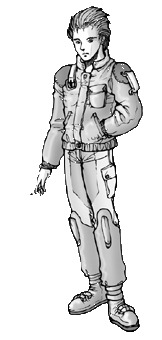

(Homo sapiens sapiens)
The most technologically advanced species ever.
Avg. Height: M - 6' F - 5'7"
Avg. Weight: M - 185# F - 150#
Hair Color: Brown, black, blonde, red
Eye Color: Brown, hazel, blue, green
Blood Pressure: 120/80
Life Expectancy: 90 years
Dist. Marks: None
|
Humans in the 22nd Century are perhaps the most advanced intelligent beings
in all history, masters of technology and the entire Earth.
Whereas most of the genotypes have only existed for a few decades, human
evolution began some 15 million years ago, with modern man beginning his
evolutionary progression between 1.5 and 2 million years ago. Human beings
have, without a doubt, far more to go on than any other genotype. Humans
domesticated the first animals. Humans discovered fire. Humans built the
first computers. And humans invented the other genotypes. Humans of the 22nd
century are best described as an eclectic technological miscellany. Unlike
their ancestors, these jacks of all trades were born, grew up with, and will
die surrounded by technology.
From the richest corporate executive to the poorest slug, all humans know
how to use technology, and this is their main advantage. Their familiarity
with the technical equipment that runs the world in the 21st and 22nd
centuries makes them more employable and more skilled than other genotypes.
The wider skill base humans enjoy comes from the fact that humans are
already quite comfortable with each others' company. While other genotypes
might be shunned because of their appearance or attitudes, humans can go
anywhere and do anything more easily. This includes attending school and
college, which allows humans to learn more before puberty than many genos
will learn in their entire lives.
Technical know-how is one of the main advantages to being human. Because
most medical knowledge is developed with humans in mind, humans benefit from
medicine much more readily, and can live more than twice as long as some of
the more unhealthy genotypes. Humans are taller and stronger than many
genotypes, and a great deal more adaptable than some--humans can survive
anywhere on Earth, from Antarctica to the middle of a desert. This
adaptability also allows humans to alter their bodies much more easily to
achieve desired results.
With the proper training, a human can learn to run a 4 minute mile, or lift
more than twice their own weight. And in the 22nd century, adaptability is
even more important. Just about any human can add cybernetic enhancements to
their body without the fear of rejection by their system. Genetic
engineering and DNA rewriting is much more successful on humans than other
genotypes, mainly because these processes were designed with humans in mind.
This adaptability, of course, can also be a severe disadvantage.
Because humans are easily changeable, chemicals and other stimuli introduced
into their environment can more easily affect them. Chemicals in the water
supply, toxins in the air and other, more sinister environmental changes can
severely affect humans, often without their knowledge or consent. Perhaps
because of this fear of change, many humans choose to totally and
irrevocably distance themselves from physical interaction, leading reclusive
lives.
Gone are the days of family gatherings in the park--technology has made it
possible to live your whole life indoors, working with and playing on a
computer. Why take out the trash when a robot can do it for you? High tech
and high fashion is the way that the world runs nowadays. And society has no
place for those who can't work with the most current technology, so if
humans aren't constantly training and retraining themselves, learning more
about their world and staying on top of current trends, they quickly get
left by the wayside.
As mentioned before, this need to be knowledgeable about "everything" means
that most humans are a kind of technological conglomeration of sysop, lab
technician, electrician, audio-video expert, and every other technical trade
thrown into one big melting pot. Some may specialize or have preferences,
but the generic technician embraces all technology and tries to learn it
all, to maintain his or her employability. The world is run by computer
networks. Your television, your computers, your weapons, even the warez that
everyone's implanting into their bodies; without those who know how to
operate and fix these technologies, the world would fall apart. Who needs
hand-to-hand combat? The last war was won and lost via computers. Computer-
operated nuclear missiles, computer-guided weapons, computer-navigated
vehicles. Without technology, the world would have fallen just like Rome.
But that's not going to happen this time. Because if it starts to fall
apart, the people with the tech know-how will fix it.

INSPIRATIONAL IDEAS
Music: Anything and everything from bubble-gum pop to techno to
country-western to hip-hop.
Stories: "Brazil," "Blade Runner"
Quote: "The technology of any sufficiently advanced society is
indistinguishable from magic." --Arthur C. Clarke
Stats:
* Humans are typically average.
Pros:
* Humans make up almost 100% of the world's population.
* From medicine to technology, everything is built to the "Human" standard.
* Humans start with more opportunity, and progress quicker in life.
Cons:
* Humans do not possess any natural mutative capabilities.
|











